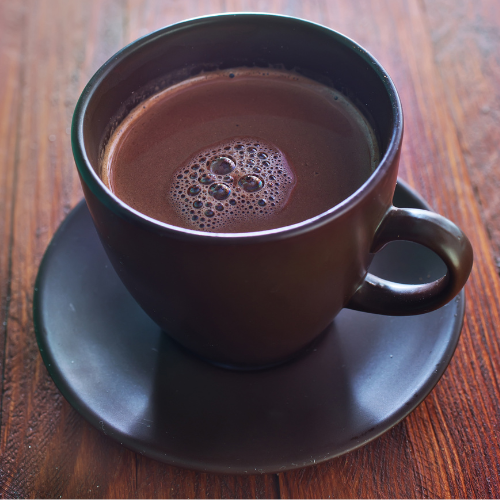Cacao is generally well tolerated when consumed in moderate amounts. As with all supplements, there can be some side effects so it’s important to know how it affects you personally.

Serving sizes of cacao are usually written on the packaging and typically range from 20-25 grams or they speak in teaspoons or tablespoons which with paste, depending on the brand.
To be sure of the purity of cacao always look for fair trade and organic certifications on cacao product labels so you know there are no other additives or fillers in the cacao.
In Ceremonies the measurements are different and a cacao ceremony facilitator should be able to tell you exactly how much is in the recipe.
The European Food Safety Authority, recommend a daily intake value is 0.1 ounces (2.5 grams).
In my morning Cacao I have 12 grams which is approximately 3 teaspoons.
A lot of companies that sell the product will tell you it is fine to drink it everyday, however in larger amounts it is definitely a good idea to have 2-3 days off per week.
Side effects can occur with too much some studies have shown consuming between 50 and 100 grams a day, can cause symptoms such as nausea, headaches, and digestive discomfort. Another rare side effect is increased heart rate due to cacao’s caffeine content.
Dose your cacao
Start low and gradually increase the dose depending on your goal and sensitivity.
Use this as a guide
If you’ve never tried Cacao before 2.5 – 5 grams. if there are no side effects then increase to:
- 10-25 grams casual dose
- 25-35 grams medium dose
- 35-45 grams ceremonial dose
Please see our other article here about cautions.
Here are a few classes of drugs that cacao may interfere with:
- Blood pressure medications: Cacao may lower blood pressure levels. Consuming cacao along with medications aimed at lowering blood pressure may increase the risk of hypotension, or dangerously low blood pressure levels.
- Blood thinners: Since cacao may reduce clotting activity, it could potentially lead to excessive bleeding if it’s consumed in high amounts in combination with drugs that prevent blood clots.
- Diuretics: Cacao contains a compound called theobromine that acts as a diuretic, meaning it increases urine production. Cacao consumption along with diuretic medications may increase the risk of dangerously low blood potassium levels, as both substances reduce the amount of electrolytes in the body.
- Stimulants: Simultaneous consumption of stimulants like ephedrine and cacao may lead to high blood pressure and heart complications.


